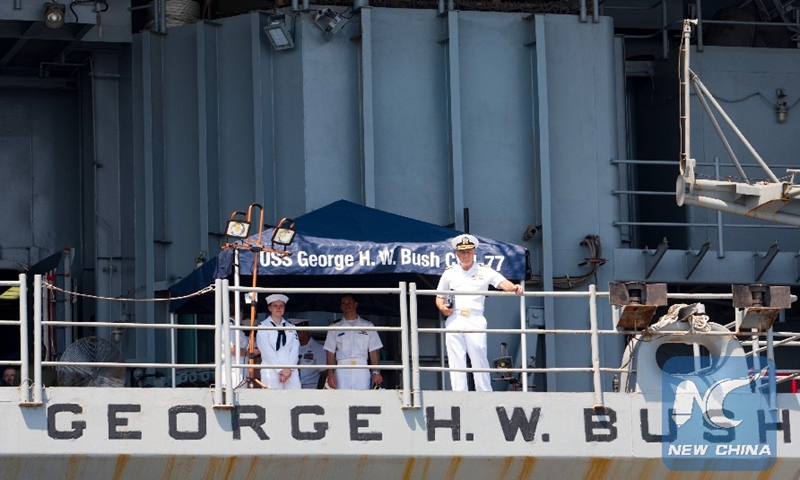
File Photo: Crew members are seen on board US aircraft carrier USS George H.W. Bush during its visit to Israel's Haifa port, on July 3, 2017.Photo:Xinhua
The Defense Security Cooperation Agency (DSCA) of the US announced Thursday that the US State Department approved a request by Taiwan for the recertification of its Patriot Advanced Capability-3 (PAC-3) air defense missiles, at an estimated cost of $620 million. On the same day, the DSCA also approved a planned purchase by Japan of 105 F-35 joint strike fighters worth roughly $23 billion.
Chinese experts told the Global Times on Friday that the US arms sales arrangement despite the COVID-19 pandemic shows that it plans to advance its plans to contain China, regardless of the issues it has with handling the virus at home. Taiwan's purchase of the US' PAC-3 air defense missiles is pointless and only helps the island build up its courage, experts say.
This marks the second time that the US has approved arms sales to Taiwan this year. The US had previously approved the sale of 18 MK-48 Mod 6 Advanced Technology Heavy Weight Torpedoes to Taiwan on May 20. The PAC-3 air defense missiles are an important weapon to improve Taiwan's high-altitude defense systems, which are deployed in Taiwan's major cities and surround Taiwan's important military facilities. The PAC-3 is the most advanced model, with a maximum interception range of up to 70 kilometers, and maximum interception altitude of over 24 kilometers. The search range of its radar can reach up to 100 kilometers and it can track 100 targets at the same time.
In regard to the US' arms sales, a spokesperson from the office of Taiwan's DPP leader welcomed and thanked the US for its commitment to the Taiwan Relations Act and "Six Assurances" and continuing to strengthen the island's military.
The spokesperson claimed that the arms purchase is to support logistics maintenance and technical services to the PAC-3, as "the Chinese mainland frequently exerts various military pressures across the Taiwan Strait and regions, and the sales will help further solidify Taiwan's high-altitude defense."
Professor Yang Chengjun, a nuclear strategy expert, told the Global Times that the arms sale is very much symbolic, and only helps build up Taiwan's confidence, rather than its military capabilities. Compared with the previous PAC-2 air defense missiles, the preparation time required for the PAC-3 is shorter. It can finish its launch preparations in 60 minutes and its interception chances are also improved. The interception probability has reached as high as 80 percent in some missile tests, but this data is taken under strict conditions, when the launch time, location, and flight trajectory of the target projectile have already been predicted.
Yang pointed out that once the Chinese mainland decides to use force to unify with Taiwan, the PAC-3 will not be useful since the specific time and location of our missile launch are unpredictable. The mainland will deploy a combination of military means, such as air and water raids. "At the moment, Chinese PLA's conventional missiles can be used for mobile operations, and their launch preparation time is very short, meaning the PAC-3 could not react in time. Considering their success rate of launch and limitations of interception, there is a much more symbolic meaning of the arms sales, rather than actual military value," Yang said.
Yang also stated that once the Chinese mainland decides to unify with Taiwan by force, it will be a comprehensive application of multiple means, rather than just missiles. The armed forces, including the navy, army and air force, will all successively attack, meaning that Taiwan may need to buy at least 30,000 PAC-3 missiles.
In regard to the US arms sales to Japan, professor Li Haidong from the China Foreign Affairs University told the Global Times on Friday that the US' arms sales to Taiwan and Japan happen regularly. "The special thing about this year is that America's perception of China's threat is more urgent than ever. The fact that the US' arms sales arrangement happens as scheduled amid the pandemic shows that it is speeding up its plans to contain China."
Li believes the political intentions of the US selling arms to Taiwan and Japan is apparent; that is, it plans to strengthen its regional alliances' confidence in its ability to ensure security. Thus, the US, Japan and Taiwan have gradually formed a military companionship which the US expects to more effectively strangle the Chinese mainland's development.
Li said he believes the US' military plans in the region will have limited impacts on the military balance in East Asia. The arms sale exposes why the US plays up the PLA's military drills in the South China Sea and East China Sea: it hopes to make Japan and Taiwan more dependent on it by hyping up the threat of the Chinese mainland.
"In the future, the US may further expand its arms sales to Japan and Taiwan, to achieve what the US believe is sufficient to constrain the Chinese mainland's military development," Li said.
Li considers it meaningless whether the US sells arms to Japan or Taiwan; it cannot change the Chinese mainland's dominant position in the region. In other words, its underhanded dealings with Japan and Taiwan will only end up with the region becoming more complicated and chaotic. It will not help the US realize its goal of containing China, Li said.
Global Times

